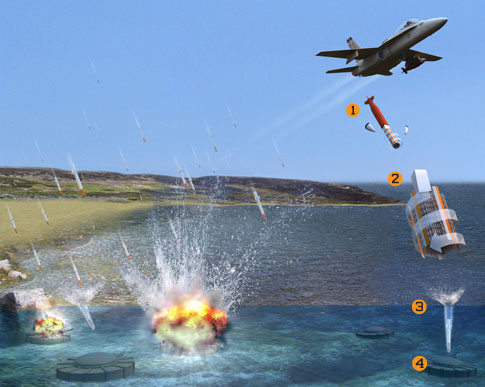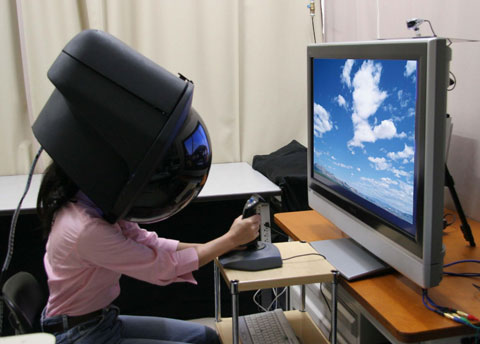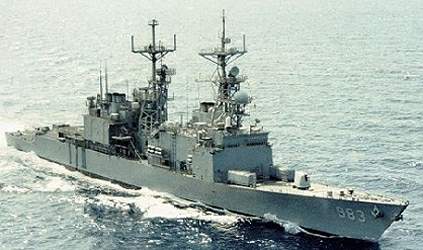So…there I was, Officer of the Deck for the 04-08 watch on a Sunday morning in the spring of 1979. It’s now about 0430 and, I, seasoned by the first operational deployment, am relatively comfortable with my assignment. Combat (Combat Information Center, or simply “CIC”) has just reported a Skunk (Unknown surface contact) Bravo, slightly off the port bow several miles out. I check in the AN/SPA-4 RADAR repeater, using a grease pencil to mark on the plotting head (lighted fixture over the actual CRT of the RADAR display). From there, I move to the port bridge wing to sweep the dark seas ahead of the ship for lights. There are none, other than those of the ships of the USS SARATOGA (CV-60) battle group, enroute the States.
We are roughly half way home, somewhere in the Atlantic. In company are the USS SARATOGA (CV-60), USS MT BAKER (AE-34), USS BIDDLE (CG-34), USS SPRUANCE (DD-963) (her maiden deployment), the USS CONYNGHAM (DDG-17), the USS JOHN KING (DDG-5) and a few other vessels that time has scrubbed from my memory cells. We (USS MILWAUKEE (AOR-2)) are assigned as the guide of the formation, steering the base course and running at the signaled base speed. All others of the battle group use us as the reference point for their formation stationing assignments.
No longer am I the CIC Officer, that job was handed over to LTJG Mike Tyner just before the cruise began, and I assumed the duties of Communications Officer from LTJG Tom Hartman. The Operations Specialists in CIC worked for me for almost 18 months prior to that, so I am pretty well in tune with their capabilities.
Skunk Bravo is not making much speed that we can discern, and the plot on my scope shows her passing close aboard to port on our present course.
I make the required call the CAPT Art Page, informing him of the situation with this unlighted contact closing us due to the relative motion of the two of us. He acknowledges my call.
About this time, maybe 0500, CIC reports Skunk Charlie on the port bow, with a track that will put her passing not far ahead of us. I look out and see range and masthead lights in the vicinity of USS BIDDLE stationed on the port bow of the formation and hear BIDDLE calling the merchant on Channel 16 on Bridge-to-Bridge radio. I got to concentrating on the (lack of) movement of Skunk Bravo. The CO comes to the bridge. Eventually, we see nothing, even when the RADAR contact shows Bravo passing between our ship and the SARATOGA (stationed on our port beam a few miles). The CO asks me if there’s anything elseand I reply “no.” He heads below to get back to sleep.
About this time, OS2 Tom Mazzula calls up from CIC on the 21MC and asks “What are your intentions with Skunk Charlie?” MY answer is “I saw her turn to pass astern of the formation.” I had seen range and masthead lights moving to show a vessel had made a radical turn to starboard earlier, which looking for the unsighted Bravo. I looked at my plot on the RADAR scope and was satisfied I had kept track of the situation, but something told me to listen to CIC. I stepped out on the port wing, raised my binoculars and saw a merchant hull standing on with a target angle of about 035 degrees (meaning if I was looking at my ship from them, what was my bearing – in this case on the starboard bow). I called CIC and informed them it must have been the BIDDLE I saw turning, as the merchant’s lights showed her steaming towards us. Tom concurred. I called the CO, he came right back to the bridge.
The CO and I stood on the port bridge wing, me at the pelorus, he with binoculars. CIC Was reporting a close aboard “CPA” (Closest Point of Approach). The CO asked what would happen if we slowed down some. I replied the ship would pass ahead of us at about 1/2 NM (100 yards). He ordered me to slow. I passed the direction to the Junior Officer of the Deck, who had the Conn. John slowed us 5 knots. After a few moments, CIC refigured the CPA and it was still close. I tried calling the merchant on Channel 16…no reponse. I went to the bridge wing and called up to the signal bridge for Sigs to flash the international code for “You are standing into danger!” They did, through through the night filter. No response.
The CO asked for the bearing of the contact. I read it through the alidade. He hollered into the pilot house “Range to the contact?” No response. “RANGE TO THE CONTACT???” No response. He and I ran to the bridge wing door to see the JOOD, back to the front windows, at the back of the bridge, talking to the Boatswain’s Mate of the Watch. The CO said: “This is Captain Page, I have the conn!” I kept the deck. I ordered the signal bridge to take the night filter off the signal lamp and flash the ship again. The white light shot across the sea with it’s staccato message. The merchant sailed on.
I called to Main Control to the Senior Chief Machinist Mate standing Engineering Officer of the watch, telling him if he got an emergency back bell, it’s wasn’t a joke and to be ready to answer it. He relied in his gruff voice “Aye, aye, sir!”
The Captain slowed another 5 knots. CIC informed the formation on Tactical radio circuits of our speed. They all slowed with us, but no one ever took the guide duties from us. The sun was coming over the horizon behind us now, lighting the merchant vessel. It was a large bulk cargo carrier, flying an Irish flag. Still, we had no indication that they saw us.
Under the circumstances, we were headed for extremis. I directed the BMOW to sound 5 short blasts of the ship’s horn. It was about 0530 now. He carried out the order quickly to signal the other ship by yet another means. Our plan, as the CO and I discussed, was to turn starboard, the proscribed maneuver in such circumstances.
The XO, CDR Al Lightly, clad in khaki trousers, flip flops and a white t-shirt, appeared on the bridge, rubbing the sleep out of his eyes. He asked “What’s going on?” I barked “GET OFF THE BRIDGE!” He sleepily complied. The Navigator, LTJG Harry Watkins, III showed up also, moving out of the way and to the chart table, keeping quiet.
Our two hulls, us being about 40,000 tons of displacement, and the merchant, certainly heavier slid towards each other, intent, with present course and speed, to occupy the space piece of water at the same time. The CO looked at me and said “We have to turn right.” I nodded. He ordered “Right Full Rudder!” “Right Full Rudder, Aye, Sir – My rudder is Right Full!” was the rapid response from the Helmsman. Then the CO said: “Shift your rudder!” as the merchant’s bow crossed ours and he also ordered “All Back Emergency Full!” The ringing of the engine order telegraph assaulted our ears three times before stopping at the “Astern Full” mark. I paralleled the order by voice on the 21 MC.
The merchant, slid across our bow at about 200 yards. Seems like a lot? Not when you have two vessels of such size that close together. Had we turned to starboard, with the merchant standing on, wrong as he was, the “transfer” (sideways distance the ship would go before attaining the ordered course would have carried our port side into hers. Relative speed would have been the slowest of the possible geometries, but still, a career ending would have occurred. Had we and the merchant turned starboard, the collision would have raked our port sides the length of each other, with greater relative speed, and therefore greater damaging forces involved.
By turning port, Captain Page set up a situation where we would pass under her stern, or she would have had her transfer in a starboard turn, take her clear of our starboard side. It was the perfect solution. Captain Page was quite a ship handler. We resume the base course and speed, watching from the starboard wing as the merchant proceeded northward, never seeming to realize the escape from bent metal and admiralty claims.
Now, breathing a sigh of relief, I took the conn from the CO, he said to me, as he was about off the bridge: “Get back on station.” “Captain, we are the guide.” ” I know, get back on station.” “Captain, we are on station.”
He looked at me like I was undermining his authority before the little light bulb in his head went off and he said “Very well” and went below.











